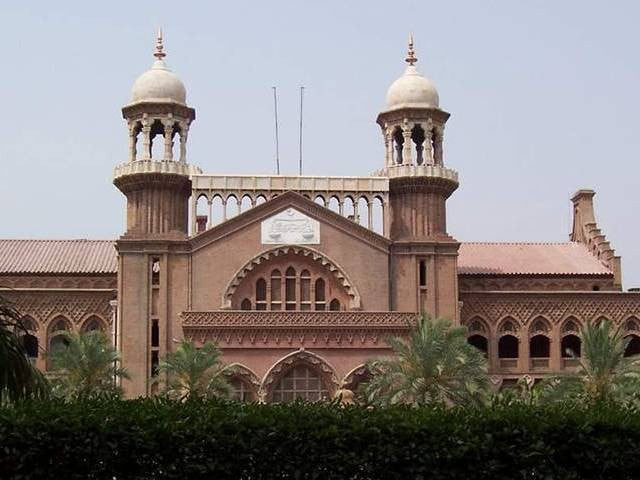LHC constitutes larger bench to hear plea against ECP’s decision disqualifying Imran
Counsel says ECP violated Constitution as it is neither a court nor tribunal to have capability on interpreting law

The Lahore High Court (LHC) on Wednesday constituted a larger bench, headed by Chief Justice Lahore High Court Justice Muhammad Ameer Bhatti, to hear a plea challenging the Election Commission of Pakistan's (ECP) relevant section under which the former prime minister Imran Khan was disqualified.
Earlier, LHC’s Justice Sajid Mehmood Sethi had sent the case file to LHC’s chief justice for constituting a larger bench on this matter.
During that proceeding, Additional Attorney General Nasar Ahmed raised an objection over the maintainability of the petition. No concerned ministry was made respondent in the petition, he further told the court.
The petitioner’s counsel, Advocate Azhar Siddique, then requested the court to send the matter before the larger bench. At this point, Ahmed did not disagree.
Read: ECP official records affidavit in Toshakhana case
The petitioner’s counsel argued that we have to examine whether or not the ECP could disqualify any member of the parliament. He argued that neither the electoral watchdog is the court nor it has the judicial powers to decide this matter. He contended that ECP exceeded its jurisdiction while disqualifying former the PTI chief adding that the election tribunal could only disqualify any member of the parliament.
However, a lawyer representing the ECP sought a fifteen-day time for submitting a reply.
Petition
Petitioner’s counsel senior advocate Azhar Siddique in the petition implored the court that section 137(4) of the Election Act, 2017 be declared ultra-vires the Constitution of the Islamic Republic of Pakistan, 1973 with further contention that the concerned authorities, especially the ECP, be restrained from taking any action or proceedings in this matter as the ECP is not a court of law and has no jurisdiction to do so.
Article 63(1)(p) of the Constitution states that an individual is, “for the time being, disqualified from being elected or chosen as a member of the Majlis-e-Shoora (parliament) or of a provincial assembly under any law for the time being in force”.
However, this provision does not apply to Imran’s case as there is not even mention of “disqualification” in the sections mentioned in the ECP order such as sections 137, 167 and 173 of the Act whilst Article 63(1) (p) of the Constitution permits punishment mentioned in any law for the time being in force, he further added.
Likewise, not sharing details of Toshakhana gifts and proceeds from sales does not lead to disqualification. It can occur only when prosecution is commenced within 120 days of filing under Articles 63(2) and (3) of the Constitution, advocate Siddique told the court.
ECP has violated the Constitution as it is neither a court nor a tribunal to have the capability on interpreting the law. ECP has adopted an incorrect interpretation, and has gone beyond its mandate and the mandate of law.
Also read: Dubai-based businessman claims Toshakhana gifts sold to him
It is worthwhile to mention herein that various judgments have been passed by the courts of Pakistan with regard to the fact that ECP is not a court of law, he implored the court.
The electoral watchdog could have promulgated its own independent Act, however, the same cannot encroach upon the jurisdiction of the high court and the August Supreme Court of Pakistan. Under the law, the deposed premier is a member of the National Assembly of Pakistan after winning six out of eight seats in the recently held by-polls of the NA, and he can take the oath of his office, at any time, whilst ECP has no authority to restrain him from doing so.
It is also pertinent to mention herein that it is nonetheless a hollow verdict, it would have been rendered meaningless under Article 63(1)(g) of the Constitution, as ECP is not a court of law. He referred to a recent observation by Chief Justice of Pakistan Umar Ata Bandial, wherein the top judge said handing down disqualification to a lawmaker for life under Article 62(1)(f) of the Constitution could only be done through a declaration by a court of law, added the counsel.
Siddique furthered that all the instances which have been provided in Section 167 of the Act are clearly in a pre-poll context, hence, there is no corrupt practice on part of Imran Khan, whatsoever. ECP has deliberately erred in law and has utterly failed to comprehend its own governing law. Furthermore, when the limitation according to Section 137 of the Act is over (120 days), then, how is it possible that an order under Section 167 of the Act is being passed. Section 137 of the Act, is, therefore, ultra-vires the Constitution, especially, Articles 218 and 222.



















COMMENTS
Comments are moderated and generally will be posted if they are on-topic and not abusive.
For more information, please see our Comments FAQ